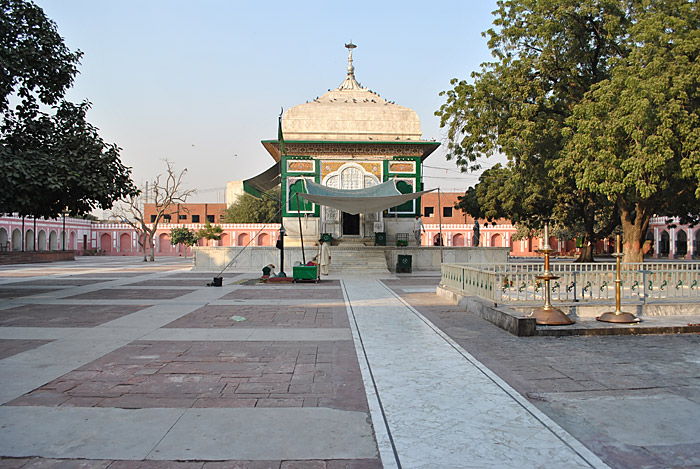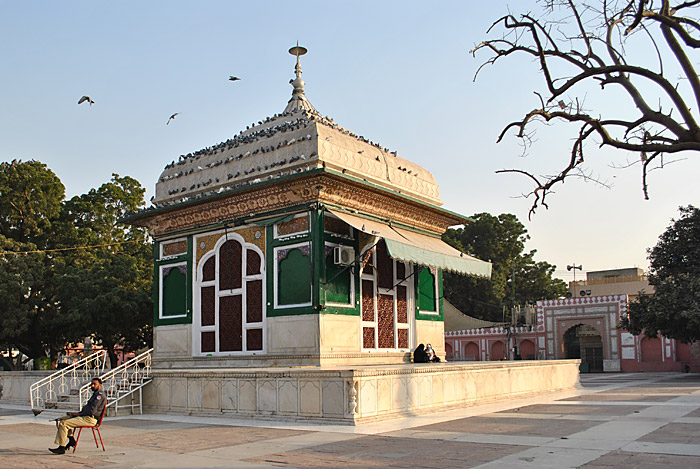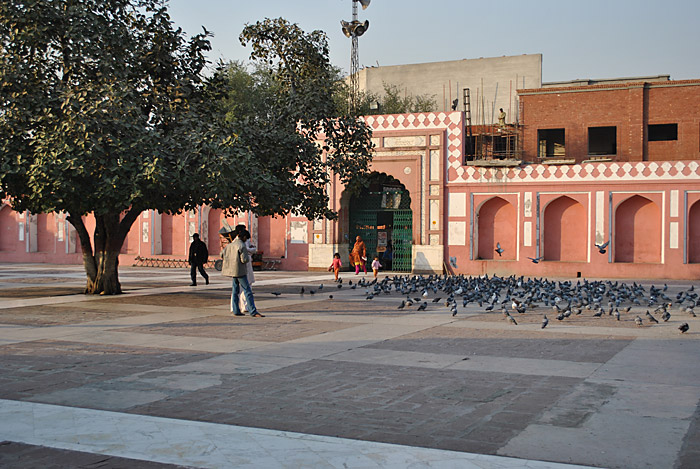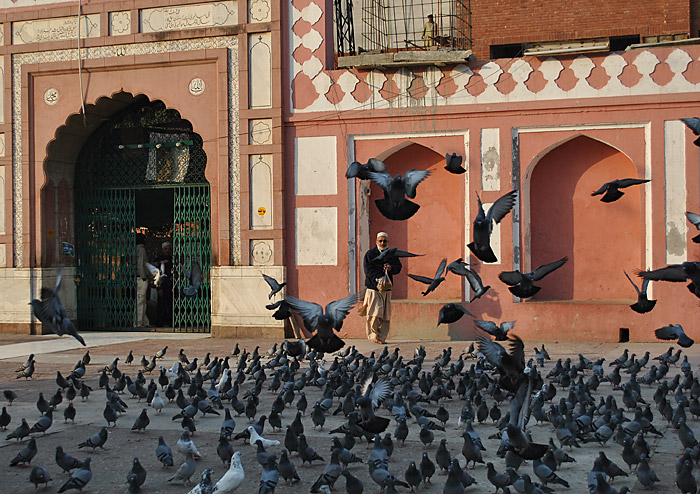Hazrat Mian Mir Tomb
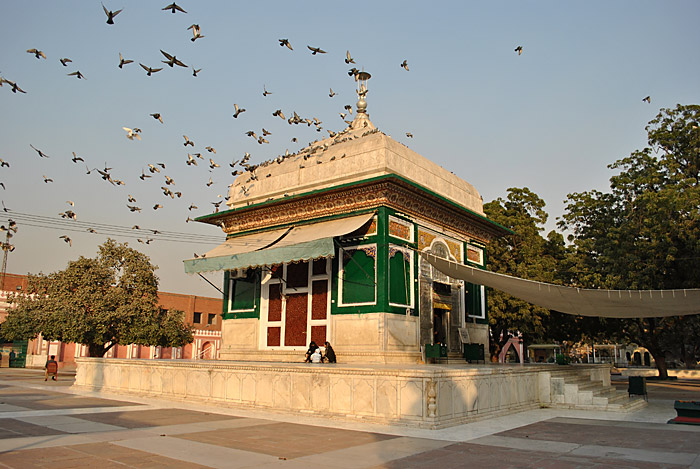
Baba Sain Mir Mohammed Sahib (c. 1550 - 22 de agosto de 1635), conocido popularmente como Mian Mir o Miyan Mir, fue un famoso santo musulmán sufí que residía en Lahore, específicamente en la ciudad de Dharampura (en el actual Pakistán). Era descendiente directo del califa Umar ibn al-Khattab. Pertenecía a la orden sufista Qadiri. Es famoso por ser un instructor espiritual de Dara Shikoh, el hijo mayor del emperador mogol Shah Jahan. Se le identifica como el fundador de la rama Mian Khel de la orden Qadiri. Su hermana menor, Bibi Jamal Khatun, era discípula suya y una notable santa sufí por derecho propio.
Mian Mir era amigo de las personas que amaban a Dios y evitaba a los hombres egoístas y mundanos, los emires codiciosos y los nawabs ambiciosos que corrían tras las faqirs para obtener sus bendiciones. Para evitar que esas personas vinieran a verlo, Mian Mir colocó a sus mureeds (discípulos) en la puerta de su casa.
Una vez, Jahangir, el emperador mogol, con todo su séquito vino a rendir homenaje al gran faqir. Vino con toda la pompa y el espectáculo que le correspondía a un emperador. Sin embargo, los centinelas de Mian Mir detuvieron al emperador en la puerta y le pidieron que esperara hasta que su maestro le diera permiso para entrar. Jahangir se sintió desairado. Nadie se había atrevido jamás a retrasar o cuestionar su entrada a ningún lugar de su reino. Sin embargo, controló su temperamento y se compuso. Esperó a que le dieran permiso. Después de un tiempo, fue conducido a la presencia de Mian Mir. Incapaz de ocultar su vanidad herida, Jahangir, tan pronto como entró, le dijo a Mian Mir en persa: Ba dar-e-darvis darbane naa-bayd ("En la puerta de un faqir, no debería haber centinelas"). La respuesta de Mian Mir fue: "Babayd keh sage dunia na ayad" (Para que los hombres egoístas no entren).
El emperador se sintió avergonzado y pidió perdón. Luego, con las manos juntas, Jahangir le pidió a Mian Mir que orara por el éxito de la campaña que tenía la intención de lanzar para la conquista del Deccan. Mientras tanto, un hombre pobre entró e, inclinando la cabeza ante Mian Mir, le ofreció una rupia. El sufí le pidió al devoto que recogiera la rupia y se la diera a la persona más pobre y necesitada de la audiencia. El devoto pasó de un derviche a otro pero ninguno aceptó la rupia. El devoto regresó a Mian Mir con la rupia diciendo: "Maestro, ninguno de los derviches aceptará la rupia. Parece que nadie la necesita".
"Ve y dale esta rupia", dijo el faqir, señalando a Jahangir. "Es el más pobre y necesitado de todos. No contento con un gran reino, codicia el reino de Deccan. Por eso, ha venido desde Delhi para mendigar. Su hambre es como un fuego que quema todo tanto más furiosamente con más madera. Lo ha vuelto necesitado, codicioso y sombrío. Ve y dale la rupia ".
Tras su muerte en 1635, Dara Shikoh pronunció su discurso fúnebre. La tumba sigue siendo popular entre los musulmanes y los sijs hasta el día de hoy.
Baba Sain Mir Mohammed Sahib (c. 1550 – 22 August 1635), popularly known as Mian Mir or Miyan Mir, was a famous Sufi Muslim saint who resided in Lahore, specifically in the town of Dharampura (in present-day Pakistan). He was a direct descendant of Caliph Umar ibn al-Khattab. He belonged to the Qadiri order of Sufism. He is famous for being a spiritual instructor of Dara Shikoh, the eldest son of Mughal emperor Shah Jahan. He is identified as the founder of the Mian Khel branch of the Qadiri order. His younger sister Bibi Jamal Khatun was a disciple of his and a notable Sufi saint in her own right.
Mian Mir was a friend of God-loving people and he would shun worldly, selfish men, greedy Emirs and ambitious Nawabs who ran after faqirs to get their blessings. To stop such people from coming to see him, Mian Mir posted his mureeds (disciples) at the gate of his house.
Once, Jahangir, the Mughal emperor, with all his retinue came to pay homage to the great faqir. He came with all the pomp and show that befitted an emperor. Mian Mir's sentinels however, stopped the emperor at the gate and requested him to wait until their master had given permission to enter. Jahangir felt slighted. No one had ever dared delay or question his entry to any place in his kingdom. Yet he controlled his temper and composed himself. He waited for permission. After a while, he was ushered into Mian Mir's presence. Unable to hide his wounded vanity, Jahangir, as soon as he entered, told Mian Mir in Persian: Ba dar-e-darvis darbane naa-bayd ("On the doorstep of a faqir, there should be no sentry"). The reply from Mian Mir was, "Babayd keh sage dunia na ayad" (So that selfish men may not enter).
The emperor was embarrassed and asked for forgiveness. Then, with folded hands, Jahangir requested Mian Mir to pray for the success of the campaign which he intended to launch for the conquest of the Deccan. Meanwhile, a poor man entered and, bowing his head to Mian Mir, made an offering of a rupee before him. The Sufi asked the devotee to pick up the rupee and give it to the poorest, neediest person in the audience. The devotee went from one dervish to another but none accepted the rupee. The devotee returned to Mian Mir with the rupee saying: "Master, none of the dervishes will accept the rupee. None is in need, it seems."
"Go and give this rupee to him," said the faqir, pointing to Jahangir. "He is the poorest and most needy of the lot. Not content with a big kingdom, he covets the kingdom of the Deccan. For that, he has come all the way from Delhi to beg. His hunger is like a fire that burns all the more furiously with more wood. It has made him needy, greedy and grim. Go and give the rupee to him."
Upon his death in 1635, Dara Shikoh delivered his funeral oration. The tomb remains popular with Muslims as well as Sikhs to the present day.
